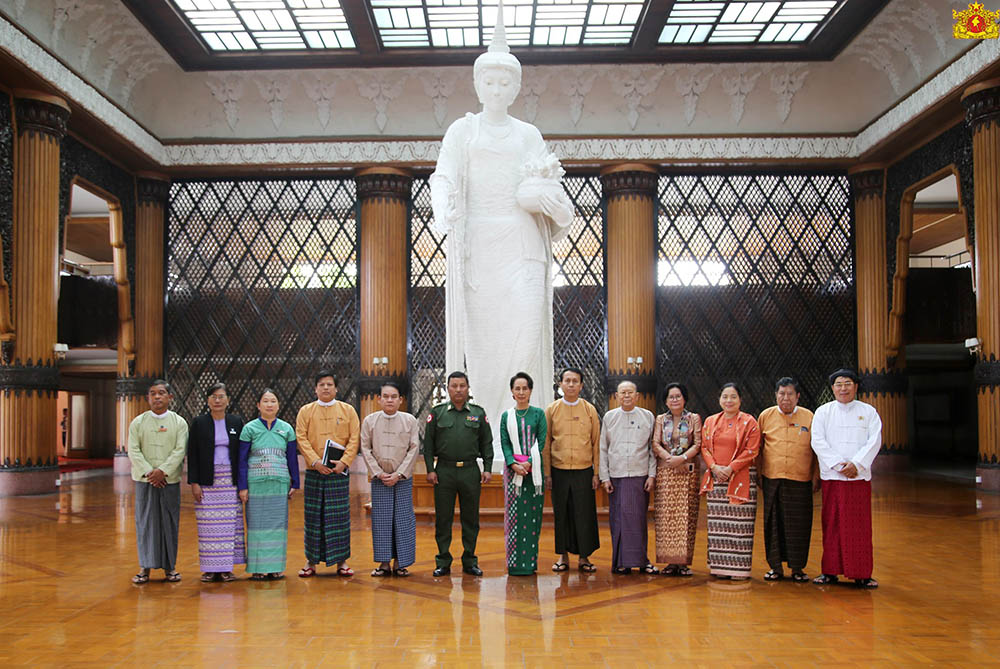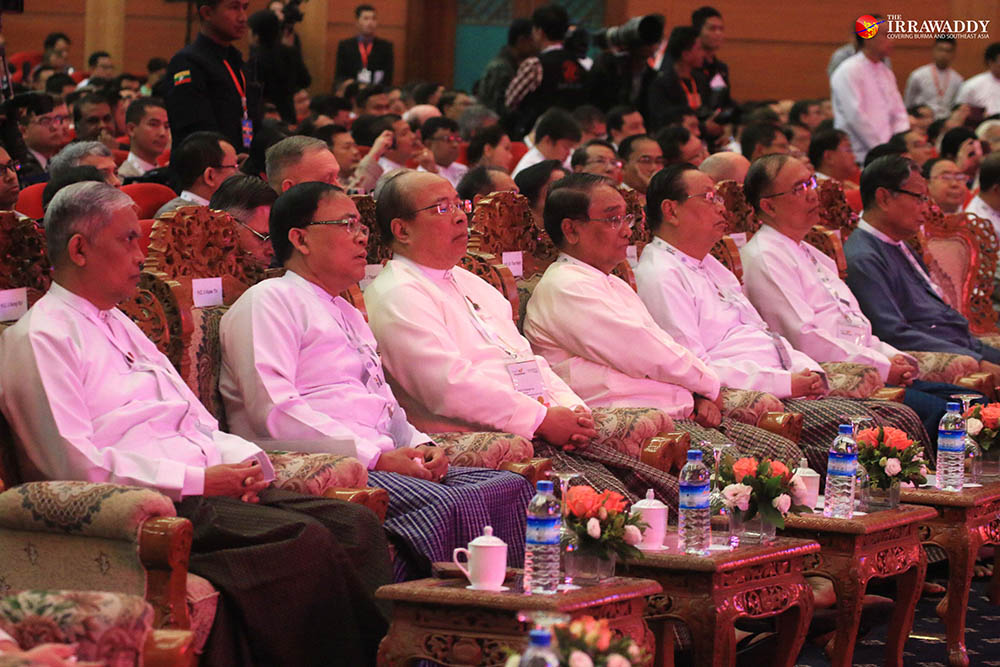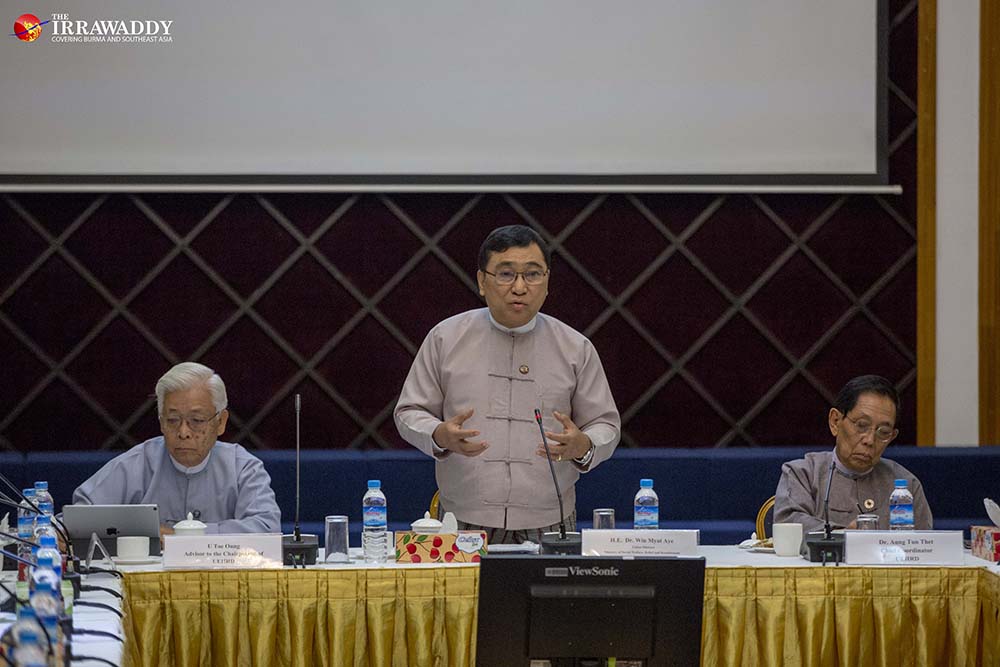Here’s a simple fact: While Myanmar’s de facto leader Daw Aung San Suu Kyi is still incomparably popular—even beloved as “Mother Suu”—among the population, to the great majority of voters, her team has been a disappointment.
Had the State Counselor addressed this matter a few years ago, her National League for Democracy (NLD) would now be enjoying the full backing not only of its historical base, but also of the approximately 5 million young, first-time voters in the country. With such unqualified support, it would be heading into this year’s general election, which is due to be held in six months, brimming with confidence.
In reality, the mood is quite different. Not even senior NLD leaders are confident their party will repeat its 2015 landslide victory when the country goes to the polls this year. The voters feel the same way.
Many people are reluctant to criticize her openly, preferring to vent their disappointments and frustrations in some form on social media. Others have simply swallowed their disappointment. Their reasons for this vary; some believe their beloved “Mother Suu” is doing her best amid a sea of difficulties; some quietly hope she will yet address the government’s failings; some console themselves with the knowledge that her team, for all its shortcomings, is incomparably better than the previous government made up of corrupt ex-generals who routinely abused their power. Still others are hoping that patience will pay off, reasoning that the first civilian government in many decades needs more time to repair the devastation wrought by its predecessors.

Those are all reasonable views.
Since the NLD took power in 2016, only a handful of the ministers from the 24 ministries represented in her cabinet have managed to impress the public with their performances. Similarly, only a few of the 14 NLD chief ministers of the seven states and seven regions across the country have satisfied their local populations. (Aside from being State Counselor, Daw Aung San Suu Kyi is also minister of foreign affairs and minister of the President’s Office.)
These 38 ministers are in crucially important positions when it comes to addressing the many problems that developed over decades under the former dictatorship, from ending mismanagement and reviving the battered economy, to replacing poor infrastructure and reducing social inequality. No one is naïve enough to suggest that these problems have short-term solutions, or could be fixed within a government’s five-year tenure, but it’s fair to say that if the ministers had performed better, more progress would have been made.
Looking at the government’s performance, only a couple of ministers can point to a good track record in the eyes of the public over the past few years. (For the purposes of this discussion, of the 24 ministries, we won’t count three: Defense, Home Affairs and Border Affairs, as they are not directly under the central government’s control. Those three ministers are not appointed as part of the process under which the government, including Daw Aung San Suu Kyi herself, is appointed; rather, they are constitutionally appointed by the army chief.)
Credit must go to the Ministry of Health and Sports and the Ministry of Welfare, Relief and Resettlement. Daw Aung San Suu Kyi herself has publicly praised these two ministers, Dr. Myint Htwe and Dr. Win Myat Aye, respectively, on more than one occasion. Some observers have also given high marks to the Ministry of Planning, Finance and Industry after U Soe Win was appointed to lead it in May 2018. He replaced U Kyaw Win, who was forced to quit in the wake of a corruption investigation by the Anti-Corruption Commission (ACC).

The appointment of U Kyaw Win came as a huge disappointment to NLD supporters right from the start. When he was nominated by the NLD in 2016, media disclosed that his CV included a bogus doctoral degree, something he later admitted to. But the NLD leadership ignored the disclosure and the media reports, and kept him on as the minister for two years until another big corruption scandal involving him surfaced. Many observers now regard those years as a total waste for such an important ministry. The question is why Daw Aung San Suu Kyi and other senior NLD figures involved in selecting ministers weren’t able to properly assess that a person with a bogus degree was unqualified in the first place.
Last month, the law caught up with one of the “black sheep” in the NLD’s fold. Daw Lei Lei Maw, the former chief minister of Tanintharyi Region in southern Myanmar, was sentenced to a total of 30 years in prison for bribery. Three years after her 2016 appointment as chief minister, the ACC filed four cases against her, leading to her dismissal and arrest. The public responded positively to news of a minister being punished for corruption, and the NLD was hailed for its actions in her case.
Obviously, in making some ministerial appointments, Daw Aung San Suu Kyi had to rely on the advice of others. Her small team, including U Win Htein (a senior party leader when the NLD formed the government who now serves as a patron), nominated most ministers and chief ministers based on their CVs. A trio of top NLD top leaders, including Daw Aung San Suu Kyi and U Win Htein, interviewed most candidates and made a decision. It is believed that Daw Lei Lei Maw was handpicked by U Win Htein, who in a recent interview continued to insist she was an honest person even after the court handed her a lengthy prison term. Now, with U Win Htein no longer occupying such a powerful position, Daw Aung San Suu Kyi seems to have learned a few lessons about the process of making ministerial appointments.

Members of the NLD have consistently but quietly complained about the way their leader picks Union ministers; in particular, they are aggrieved by the fact that some of them are from the previous government. Daw Aung San Suu Kyi appointed at least five ministers or high-ranking officials who served in the previous military regime or the U Thein Sein government and who previously belonged to the Union Solidarity and Development Party (USDP), the country’s former ruling party. That means non-NLD members account for 25 percent of appointments to the 21 ministries her government can control. But if we look at the performances of these five, some have not been bad despite their tainted reputations as members of the former government. One of them is Minister for Religious Affairs U Aung Ko, who has proved himself to be instrumental in controlling the ultranationalist Buddhist groups such as Ma Ba Tha, now known as the Buddha Dhama Parahita Foundation, and the nationalist firebrand fugitive monk U Wirathu.
Choosing political appointees is not a matter of right and wrong, it’s an art; Daw Aung San Suu Kyi’s appointments can be understood as a reflection of her political thinking. Certainly they are understandable from a political point of view. Simply put, she didn’t want her government to be seen as winner-take-all. She was sending a signal that her administration wasn’t open exclusively to NLD people (despite its landslide victory) and was willing to share ministerial positions with individuals from the old regime. She clearly considers such an approach to carry great symbolic significance and to promote national reconciliation.
In fact, some of her apparent personal favorites in the cabinet are known to be unpopular among NLD people. One is U Kyaw Tint Swe, minister of her own Ministry of the State Counselor’s Office. A career diplomat who joined the country’s Foreign Ministry in 1968, he served as the country’s ambassador and permanent representative to the United Nations under former military dictator Senior General Than Shwe. He was also vice chairman of the Myanmar National Human Rights Commission under the military-backed USDP government led by former president U Thein Sein.

Mainly for those reasons, many politicians, observers, activists and even NLD members have quietly questioned why she brought him on board. Many diplomats seem to dislike him, as he acts as a gatekeeper for Daw Aung San Suu Kyi, rather than her minister. (But no one, least of all NLD members, would make such criticisms publicly.)
Despite their objections, he seems to be one of the small handful of ministers who are closest to Daw Aung San Suu Kyi. The minister, now in his mid-70s, seems to have impressed her with his diplomatic experience and by possessing skills she likely found rare within her own party. Whatever the case may be, in the case of this particular minister, ordinary people and voters are unlikely to be troubled, as most are largely unaware of him or his background.
Around March 2018, when Daw Aung San Suu Kyi chose U Win Myint, a senior NLD member who was at that time the Speaker of the Lower House, to be the country’s new President, many people expected a major cabinet reshuffle would follow. There were rumors that the appointment of this seemingly active new President would see underperforming ministers and chief ministers shown the door. But no such thing happened. Daw Aung San Suu Kyi could well have made such a decision—nobody knows why she chose not to seize the opportunity to make her government more efficient and boost its capacity to get things done.

Around that time, one educator who is close to Daw Aung San Suu Kyi confided in me that he once suggested she replace the current education minister, who is generally regarded as inefficient. Daw Aung San Suu Kyi responded by asking for the name of a suitable replacement. The educator, however, declined to offer one. I asked him why. The educator said he couldn’t think of anyone he could vouch for. It seemed to be a case of “better the devil you know.”
When it comes to public recognition, people tend to pay more attention to the chief ministers of the 14 states and regions. They are responsible for everything in their areas. Again, none stand out as brilliant. Interestingly, the chief ministers of Shan, Kachin, Mon, Sagaing and Mandalay are all medical doctors. With the exception of Mandalay Chief Minister Dr. Zaw Myint Maung, who is popular in his region, none of the others has performed remarkably. While some are seen as “good people”, they are largely viewed as mediocre politicians and administrators.
Few of the chief ministers are admired in their respective states and regions. There has been no shortage of controversies in Kayah and Mon states over the chief ministers’ unpopular stances on hot-button political and social issues like the placement of a statue of General Aung San or the naming of a bridge after him.
The most notorious is Yangon Chief Minister U Phyo Min Thein. He has disappointed many residents of the country’s largest city over the past four years due to, among other things, his intervention in the Yangon parliament’s budget deliberation process in 2019 and his delayed response to a landfill fire that threatened the health of city residents in 2018. The most recent debacle came late last month when he violated his own government’s COVID-19 ban on mass gatherings. His action upset not only the public, but also his bosses. The President’s Office has asked him to explain his actions.

We would need a lot more time to list all the upsetting stories that have emerged regarding ministers and chief ministers. But in fact, choosing ministers and high-ranking officials in Naypyitaw is always a fraught business. No one knows for certain how someone will perform in a given job. But it is an issue with major consequences for the NLD, and it will be the party’s duty—more precisely, it will be Daw Aung San Suu Kyi’s duty—to pay attention to the matter, assuming her party wins again when the election is held later this year.
The NLD is undoubtedly still popular, but the issue of poor appointments is a major weakness for the party, and it is imperative that they address it—and that it receives the personal attention of Daw Aung San Suu Kyi.
The party’s main aim should be nothing less than to serve the people well. That’s why the people elected it.
You may aslo like these stories:
What Do We Want a Post-Pandemic Myanmar to Look Like?
Apparently, Myanmar Govt’s COVID-19 Rules Don’t Apply to Yangon Chief Minister
Myanmar’s Return of Indian Rebels: Act of Friendship or Strategic Trade-Off?















